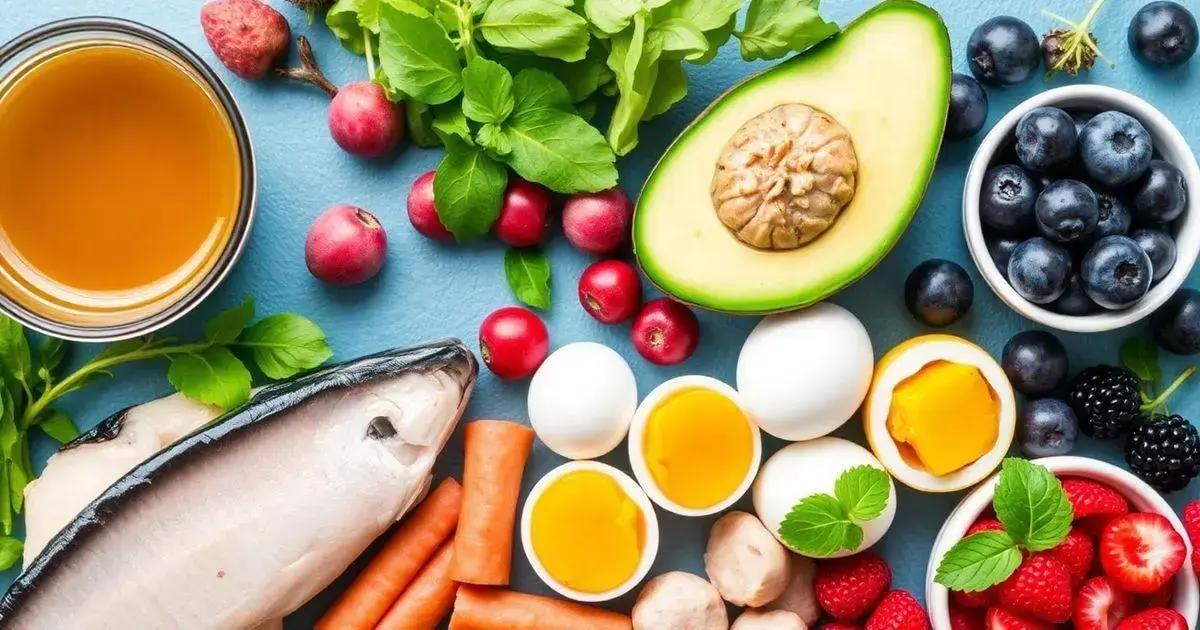To boost collagen naturally for skin and joint health, incorporate collagen-rich foods like bone broth, fish, and berries into your diet, make lifestyle changes such as staying hydrated and reducing sugar intake, and consider collagen supplements while weighing their pros and cons.
Boosting collagen naturally is crucial for maintaining healthy skin and joints, especially as we age. Collagen, a vital protein in our bodies, supports skin elasticity and joint functionality. In this article, we will discuss how to boost collagen naturally for skin and joint health through diet, lifestyle changes, and supplements. Discover the best natural sources of collagen and tips to enhance your body’s production of this essential protein.
Understanding Collagen’s Role in Skin and Joints

Collagen plays a significant role in maintaining healthy skin and joints. It is the most abundant protein in your body and is a key structural component for tissues. In skin, collagen provides elasticity and hydration, making your skin look youthful and plump. As we age, our bodies produce less collagen, leading to wrinkles and sagging skin.
In joints, collagen helps in maintaining cartilage, which cushions your joints and reduces friction during movement. Low collagen levels can result in joint pain and stiffness, affecting mobility over time.
There are different types of collagen, with Type I being the most prevalent in the skin, while Type II is mainly found in cartilage. Understanding how collagen works in your body can help you make informed choices to boost its production naturally.
By incorporating collagen-boosting strategies into your daily routine, you can improve skin elasticity and support joint health, which are essential for overall well-being.
Top Natural Sources of Collagen

To boost collagen naturally, incorporating certain foods into your diet is essential. Here are some top natural sources of collagen:
1. Bone Broth
Bone broth is made by simmering animal bones, which releases collagen into the broth. Drinking bone broth can provide your body with the necessary amino acids to produce more collagen.
2. Fish
Fish, especially those with skin, like salmon and sardines, are great sources of collagen. They also provide omega-3 fatty acids, which are beneficial for skin and joint health.
3. Chicken
Chicken is often rich in collagen, particularly in the cartilage. Many collagen supplements use chicken collagen due to its effectiveness for skin and joint support.
4. Egg Whites
Egg whites contain proline, an amino acid essential for collagen production. Including egg whites in your diet can help your body build collagen naturally.
5. Berries
Berries such as strawberries, blueberries, and raspberries are high in vitamin C, which is crucial for collagen synthesis in the body. Adding them to your meals can enhance collagen levels.
Incorporating these natural sources into your diet not only boosts collagen production but also supports your overall health and well-being.
Lifestyle Changes to Enhance Collagen Production

Making certain lifestyle changes can significantly enhance your body’s collagen production. Here are some effective methods to consider:
1. Stay Hydrated
Drinking plenty of water is crucial for keeping your skin hydrated and maintaining overall health. Proper hydration supports collagen production and helps maintain skin elasticity.
2. Reduce Sugar Intake
High sugar consumption can lead to glycation, which damages collagen and elastin. Limiting sugary foods and beverages can help maintain healthy collagen levels.
3. Get Enough Sleep
Quality sleep is essential for your body to repair itself and produce collagen. Aim for 7 to 9 hours each night to facilitate overall health and collagen renewal.
4. Exercise Regularly
Regular physical activity boosts blood circulation, delivering nutrients and oxygen to skin cells. Activities like strength training and aerobic exercises can also help increase collagen production.
5. Protect Your Skin from Sun Damage
Ultraviolet (UV) rays can break down collagen in your skin. Applying sunscreen daily and wearing protective clothing can help safeguard your skin’s collagen integrity.
By making these lifestyle changes, you can create a supportive environment for your body to enhance collagen production, promoting both skin health and joint function.
Supplementing Collagen: Pros and Cons

When considering supplementing collagen, it’s important to weigh the pros and cons. Here are some key points to consider:
Pros of Supplementing Collagen
1. Improved Skin Health: Collagen supplements may enhance skin elasticity and hydration, reducing signs of aging like wrinkles.
2. Joint Support: Collagen can help maintain cartilage, potentially easing joint pain and improving mobility, especially in older adults.
3. Easy to Incorporate: Collagen supplements come in various forms, such as powders, capsules, or drinks, making them convenient to add to your diet.
Cons of Supplementing Collagen
1. Limited Scientific Evidence: While some studies suggest benefits, more research is needed to confirm the effectiveness of collagen supplements.
2. Potential Allergic Reactions: Some collagen products are derived from animal sources, which may cause allergic reactions in sensitive individuals.
3. Not a Replacement for Natural Sources: Supplements shouldn’t replace a balanced diet rich in natural collagen sources, as whole foods provide additional nutrients.
Understanding these pros and cons can help you make an informed decision about whether collagen supplementation fits your health needs and lifestyle.
In Conclusion: How to Boost Collagen Naturally
Boosting collagen naturally is crucial for maintaining healthy skin and joint health. By understanding the role of collagen, incorporating natural sources into your diet, and making positive lifestyle changes, you can support your body’s collagen production.
Additionally, while collagen supplements may offer potential benefits, it’s important to weigh the pros and cons to make an informed choice. Always consider the power of whole foods and a balanced diet to enrich your overall health.
With the right approach, you can enhance your skin and joint health, promoting a more youthful appearance and improved mobility as you age.
FAQ – Frequently Asked Questions about Boosting Collagen Naturally
What is collagen and why is it important for my skin and joints?
Collagen is the most abundant protein in your body, providing structure and elasticity to the skin and supporting the cartilage that cushions joints.
What are some natural sources of collagen?
Top natural sources of collagen include bone broth, fish with skin, chicken, egg whites, and berries, all of which contribute to collagen production in the body.
How can lifestyle changes enhance collagen production?
Staying hydrated, reducing sugar intake, getting enough sleep, exercising regularly, and protecting your skin from sun damage can significantly boost collagen production.
Are collagen supplements effective?
Collagen supplements may improve skin elasticity and joint support, but it is essential to consider their potential lack of scientific evidence and possible allergic reactions.
Can I boost collagen without supplements?
Yes, you can boost collagen naturally through a balanced diet rich in collagen sources, vitamins, and healthy lifestyle choices.
What role does vitamin C play in collagen production?
Vitamin C is crucial for collagen synthesis as it helps stabilize collagen molecules, making it essential to consume foods rich in this vitamin, like citrus fruits and leafy greens.













